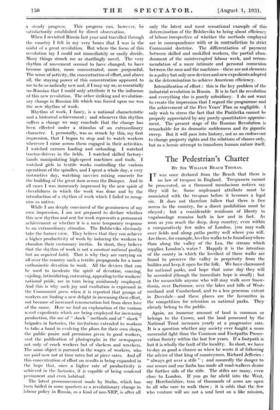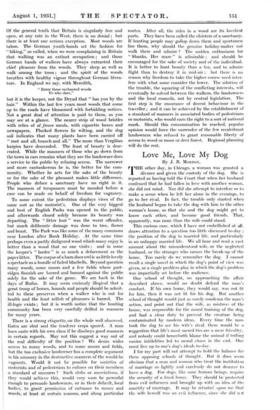The Pedestrian's Charter
BY SIR WILLIAM BEACH THOIlL4S.
IT was once declared from the Bench that there is no law of trespass in England. Trespassers cannot be prosecuted, as a thousand mendacious notices say they will be. Some unpleasant attribute must be associated with the trespass before it becomes a legal sin. It does not therefore follow that there is free access to the country, for a direct prohibition must be obeyed ; but a considerable residuum of liberty in vagabondage remains both in law and in fact. As soon as you reach the deep, deep country, even within a comparatively few miles of London, you may walk over fields and along paths pretty well where you will. Are there, for example, lovelier walks to be founcranp. vhere than along the valley of the Lea, the stream which supplies London's water ? Happily it is the intention of the county in which the loveliest of these Walks are found to preserve the valley in perpetuity from the builder and keep it open for the folk. We have clamoured for national parks, and hope that some day they will be accorded (though the immediate hope is small) ; but in the meanwhile anyone who will may walk over Snovi- d onia, over Dartmoor, over the lakes and hills of West- morland and Cumberland, and to a less generous extent in Dovedale—and these places are the favourites in the competition for retention as national parks. They already belong to the public.
Again, an immense amount of land is common or belongs to the Crown, and the land possessed by the National Trust increases yearly at a progressive rate. It is a question whether any society ever fought a more successful fight than the Common and Footpaths Preser- vation Society within the last few years. If a footpath is lost it is wholly the fault of the locality. In short, we have to-day as good a chance as when he wrote it of following the advice of that king of countrymen, Richard Jefferies : " always get over a stile " ; and assuredly the danger to our senses and our limbs has made all road-walkers desire the further side of the stile. The stiles are many, even close to London. If you go far afield into the West, say Herefordshire, tens of thousands of acres are open to all who care to walk there ; it is odds that the few who venture will see not a soul bent on a like mission, Of the general truth that Britain is singularly free and open, at any rate in the West, there is no denial ; but there is at least one serious exception. Most woods are taboo. The German youth-bands set the fashion for " hiking," so called, when we were complaining in Britain that walking was an extinct occupation ; and those German bands of walkers have always extracted their chief pleasure from the woods. They sleep as well as walk --among the trees ; and the spirit of the woods breathes with healthy vigour throughout German litera- ture. In England we say, with Meredith,
" Enter these enchanted woods Ye who dare,"
but it is the keeper, not the Dryad that " has you by the hair." Within the last few years most woods that come up to the roads have blossomed with forbidding notices. Not a great deal of attention is paid to them, as you may see at a glance. The nearer strip of wood bristles with relics of a/ fresco meals, with cigarette boxes and newspapers. Plucked flowers lie wilting, and the dug soil indicates that many plants have been carried off " root and all, branch and all." The more than Vergilian harpies have descended. The feast of beauty is dese- crated. While the manners of those who go down from the town in cars remains what they are the landowner does a service to the public by refusing access. The narrower and more cantankerous he is, the better for the com- munity. Whether he acts for the sake of the beauty or for the sake of the pheasant makes little difference. People who deface a sanctuary have no right in it. The manners of trespassers must be mended before a case can be made on behalf of freedom for vagrancy.
To some extent the pedestrian displays vices of the same sort as the motorist's. One of the very biggest and best of English Parks was opened to the public, and afterwards closed solely because its beauty was departing. The " litter lout " was the worst offender, but much deliberate damage was done to tree, flower and beast. The Park was like some of the many commons near London after Bank Holiday. At the same time perhaps even a partly disfigured wood which many enjoy is better than a wood that no one visits ; and in some the keeper's " larder " is as much a defacement as the paper litter: The corpse of a barn door owl is as little lovely a spectacle as a bundle of faded bluebells. Beyond question many woods, some moors and a few fields where part- ridges flourish are barred and banned against the public solely for the sake of the game. We are back in the days of Rufus. It may seem curiously illogical that a great troop of horses, hounds and people should be admit- ted to these preserves when a walker who is out for health and the least selfish of pleasures is barred. The ill-logic exists ; but it is worth notice that the hunting community has been very carefully drilled in manners for many years.
There is a strong etiquette, on the whole well observed. Gates are shut and the tenderer crops spared. A man loses caste with his own class if he disobeys good manners in certain regards. May not this suggest a way out of the real difficulty of the position ? We desire wider access to many woods, and to some moors and fields, but the too exclusive landowner has a complete argument in his armoury in the destructive manners of the would-be vagrants. Would it not be possible for societies of motorists and of pedestrians to enforce on their members a standard of manners ? Such clubs or associations, if they would achieve this, would very soon be powerful enough to persuade landowners, or in their default, local bodies, to grant permission of entrance to moors and Woods, at least at certain seasons, and along particular routes. After all, the rides in a wood are its loveliest parts. They-have been called the cloisters of a sanctuary. If hunting people may gallop down them and sportsmen line them, why should the genuine holiday-maker not walk there and admire ? The sudden enthusiasm for " Shanks, Her mare " is admirable ; and should be encouraged for the sake of society and of the individual. It is better to hunt beauty than a fox, and to admire flight than to destroy it in mid-air ; but there is no reason why freedom to take the higher course need inter- fere with what some consider the lower. The solution of the trouble, the squaring of the conflicting interests, wilt eventually be solved between the walkers, the landowners and the local councils, not by central legislation. The first step is the ensurance of decent behaviour in the traveller ; and it can be achieved by the establishment of a standard of manners in associated bodies of pedestrians or motorists, who would earn the right to a sort of national mark.. Should this consummation be reached, popular opinion would force the surrender of the few recalcitrant landowners who refused to grant reasonable liberty of access to wood or moor or deer forest. Regional planning will do the rest.



































 Previous page
Previous page